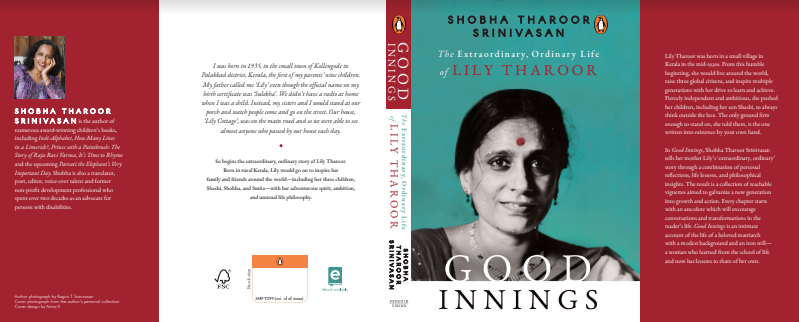by Shobha Tharoor Srinivasan
Penguin Viking, India, 2022
We Indians must have one of the strongest traditions in the world of respect for older folk. I am from the generation where we touched my parents’ feet every morning. Indeed, even now, by way of greeting me on first meeting after any length of time, some of my nephews and nieces still touch my feet – either actually, or in the usual symbolic way. So I find it quite surprising how few books we Indians have published on parents – though there have indeed been some outstanding ones, such as Ved Mehta’s Papaji and Mamaji.
The mother of Shashi Tharoor (the polymath who is easily the most impressive member of our Parliament), and of his two sisters, is Lily Tharoor.
On her life, one of her daughters, the distinguished author Shobha Tharoor Srinivasan, has written Good Innings – which is book-ended by touching tributes to Lily from her son, as well as from the author and from the author’s daughter.
The author modestly says that the book is “neither a biography nor simply a self-help text with culled dictums for living” but rather “an individual reflection on moments”.
Her use of the words “reflection” and “dictums” refers to several features of the book. For example, there are chapter-titles such as “Believe in yourself”, “Embrace the Unexpected”, and “Age is Only a Number”. Then there are the aphorisms which the author uses to start each chapter. And there are occasional proverbs scattered through the text (such as Harrington Emerson’s, “Without ambition one starts nothing. Without work one finishes nothing. The prize will not be sent to you. You have to earn it”). Indeed, there are also Aesop-like concluding life-lessons to some of the chapters. All these are entirely apposite.
As are Lily’s personal reflections, which run like a leitmotif through the book. Though, in her own eyes, she remains a “simple woman born in a village in Kerala, not ‘convent-educated’”, Lily had the privilege of growing up with parents who were enlightened even by Malayali standards, and who valued, nurtured and encouraged her. The result was that, schooled also by the trials and tribulations of later life, including relatively early widowhood, she developed a rather strong personality. Her fierce independence apparently continues even now in her eighties – “sometimes to our frustration”, says the author. What shines out of the book is her “strong and constant restless drive to learn and achieve, so that she continues to demand the best and the most out of those she interacts with … (and) continues to push the next generation to think outside the box. Despite her current slow gait, her mind races with the spirit of enquiry; she forwards information and advice daily, and she continues to seek ‘the best out of life’.”
The result is more of a biography than the author seems to think – or perhaps the book is closest to being a memoir, “a collection of stories … from the life of an independent woman” who is or has been, by turns, a daughter, mother, grandmother, and great-grandmother. While Lily “berates herself for not inventing anything that would be of use to others”, she has created a legacy not only in her notable children and grandchildren but also now through this book.
As you may have concluded by now, Lily’s full and most interesting life provides the materials for the smörgåsbord which is Good Innings. From that, readers may pick moments to dwell on, if they wish – though I found it hard to put my plate down once I had started on the repast, gliding past the instruction, because the enjoyment quotient is so high.
So now you know why I have included Good Innings in my Book of the Month series – in other words, since I have never met Lily, the reason is not the respect that Indians have for older folk.

